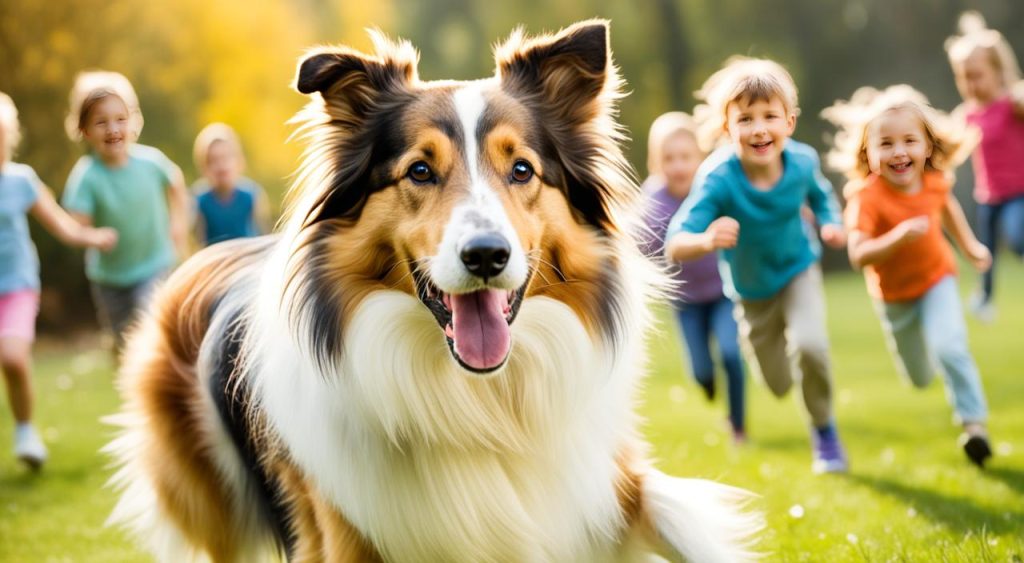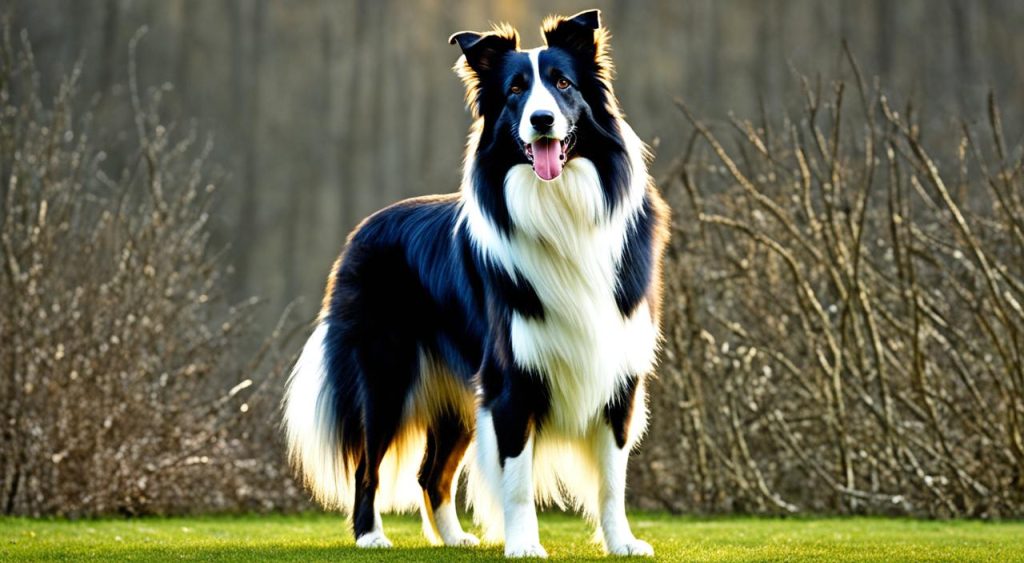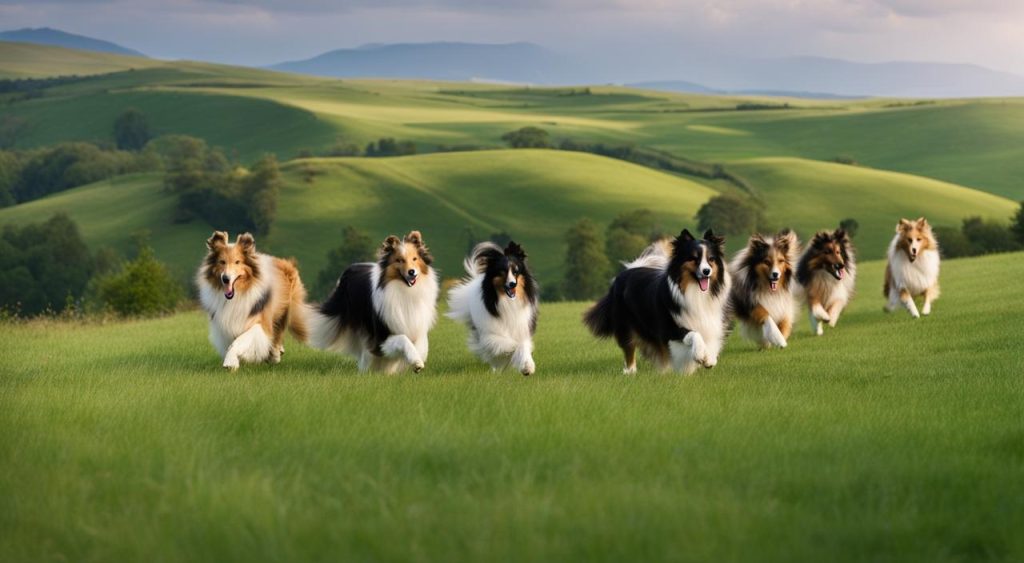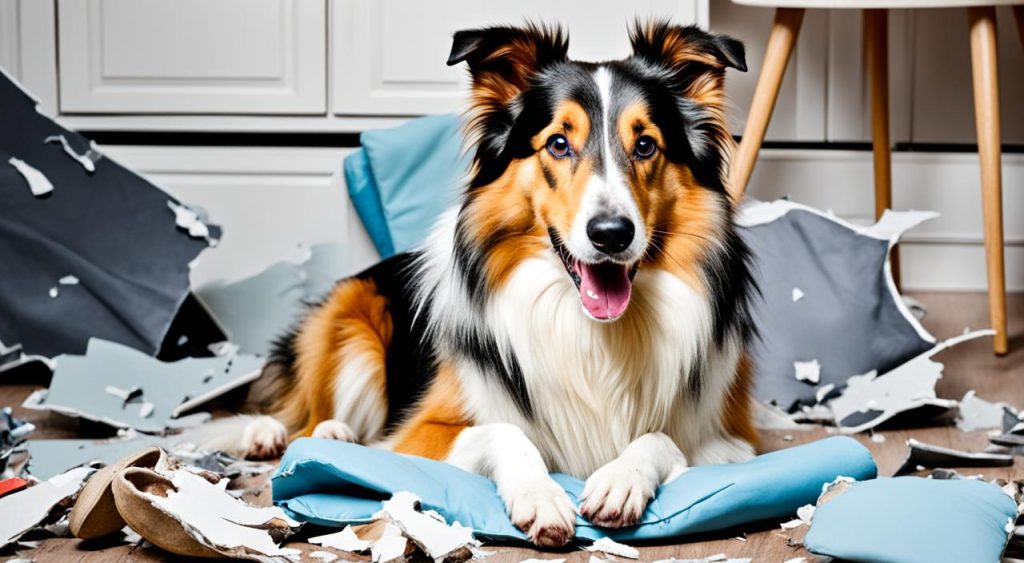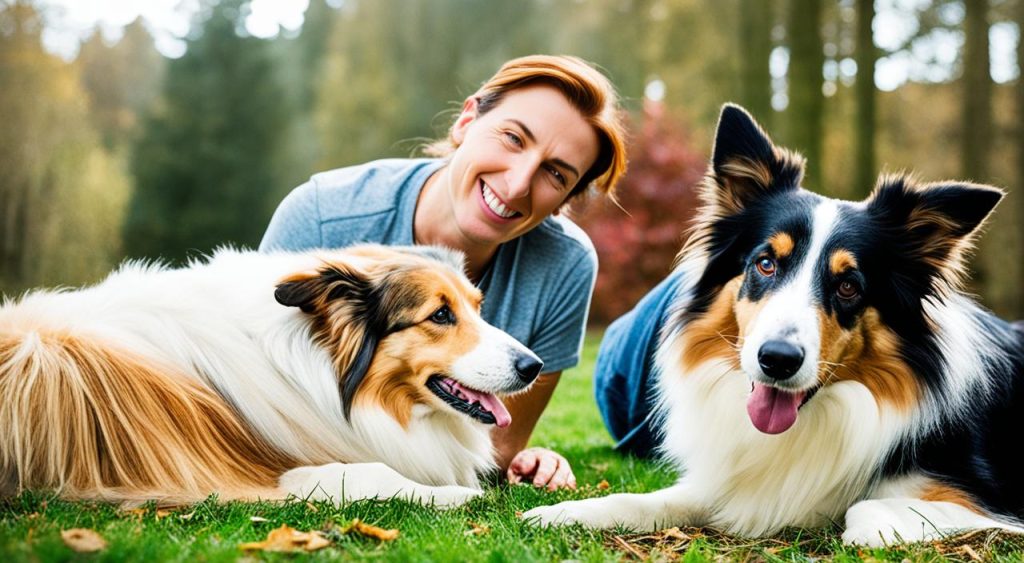When it comes to Collies, their gentle and intelligent nature is often praised. However, some people may have concerns about the temperament of these beloved dogs. In this article, we will delve into the topic of Collie dog aggression and uncover the truth behind this common misconception.
Rough Collies, also known as “Lassie dogs,” are renowned for their long coats and undeniable intelligence. But are they aggressive by nature? Let’s explore the Collie dog temperament, debunk any myths surrounding their aggression, and examine the factors that influence their behavior.
Key Takeaways:
- Rough Collies are generally gentle, empathetic, and loyal dogs.
- Their history as herding dogs makes them great companions for families.
- Factors like genetics, early socialization, training, environment, and health can affect a Collie’s behavior.
- Contrary to popular belief, Rough Collies are not inherently aggressive.
- Biting behavior is not a common trait in Collies or any other breed.
Understanding Rough Collie Temperament
Collies are known for their gentle and empathetic nature, making them excellent companions for families. With a history as herding dogs, Rough Collies possess unique traits that contribute to their exceptional temperament. These dogs are highly intelligent and have a remarkable ability to pick up on their owner’s emotions.
Rough Collies are generally friendly and sociable animals. They enjoy being in the company of both humans and other animals, making them an ideal choice for households with multiple pets. Their loyal nature is evident in their unwavering devotion to their owners, making them great family pets.
Despite their intelligence and sensitivity, Rough Collies are not high-strung or hyperactive. Instead, they have a calm and composed demeanor, which makes them well-suited for various living environments. Their natural inclination to herd can manifest in gentle behaviors, such as nudging or circling, rather than aggression.
Rough Collies thrive on human interaction and are eager to please their owners. With proper training and socialization, they can become well-mannered and obedient dogs. Their friendly disposition extends to strangers as well, making them less likely to show aggression towards unfamiliar individuals.
Factors Affecting Rough Collie Behavior
Several factors can influence a Collie’s behavior. Genetics play a role, as some dogs may be more predisposed to reactive or aggressive behavior. Early socialization and training are crucial in shaping a Collie’s behavior. The environment in which a Collie is raised also affects their behavior. Health issues can also contribute to irritability and aggression in dogs.
Genetics can have a significant impact on a Collie’s behavior. While not all Collies will exhibit aggressive tendencies, certain genetic traits can make some dogs more prone to reactive or aggressive behavior. It’s important to be aware of your Collie’s genetic background and work with a professional trainer to address any behavior issues.
Early socialization and training are essential in shaping a Collie’s behavior. Properly exposing a Collie to various environments, people, and other animals from a young age helps them develop social skills and confidence. Training should focus on positive reinforcement techniques to encourage desired behaviors and discourage aggression.
The environment in which a Collie is raised plays a crucial role in their behavior. A supportive and nurturing home environment helps create a stable and well-adjusted Collie. Conversely, a chaotic or abusive environment can contribute to anxiety and aggression in a Collie. Providing a loving and structured home can help prevent behavior issues.
Health issues can also impact a Collie’s behavior. Pain or discomfort caused by underlying medical conditions can make a dog more irritable or reactive. Regular visits to the veterinarian are essential to identify and address any health issues that may be contributing to your Collie’s aggression.
Are Rough Collies Aggressive?
Contrary to popular belief, Rough Collies are not inherently aggressive dogs. They are usually gentle, affectionate, and make wonderful companions. However, it is important for pet owners to provide proper care, training, and socialization to ensure that their Collies become well-adjusted and well-mannered dogs.
Rough Collies have a reputation for their calm and gentle nature. They are known to be highly intelligent and eager to please their owners. With proper training and socialization, they can become well-behaved pets that get along well with children, other animals, and strangers.
Are Rough Collies Prone to Biting?
While individual Collies may develop biting behavior, it is important to note that this is not a common trait in Collies or any other breed. Biting behavior in dogs can be caused by various factors, such as lack of proper training or fear, and it is crucial to address the root causes rather than assuming it is a breed characteristic. Aggression in dogs, including biting, is typically a result of external factors and individual experiences.
Understanding the signs of aggression in Collies can help identify and address any potential issues. Signs of aggression may include growling, snarling, snapping, or biting. It is important to note that these signs can be indicative of fear, anxiety, or territorial behavior, rather than inherent aggression.
When dealing with biting behavior in Collies or any other dog, it is recommended to seek professional help from a qualified dog trainer or behaviorist. They can provide guidance on training techniques and behavior modification strategies tailored to the individual dog’s needs.
Remember, responsible pet ownership, including proper training, socialization, and a nurturing environment, plays a crucial role in preventing and addressing aggressive behavior in Collies. By understanding the individual needs and temperament of your Collie, you can create a safe and harmonious relationship that promotes their well-being and happiness.
Misconceptions about Collie Aggression
One common misconception is that herding breeds like Rough Collies are more prone to aggression due to their protective nature. However, being protective does not mean being aggressive. Collies may exhibit herding behaviors towards children, but this is not an act of aggression. It is important to understand the difference between natural behaviors and aggression in Collies.
Collies have a natural instinct to herd and protect, which may manifest as nipping or chasing behavior when they interact with children. This behavior should not be mistaken for aggression. Collies are simply displaying their herding instincts and attempting to keep the children together and in line, similar to how they would with a flock of sheep.
It is crucial to address any concerns about Collie behavior with accurate knowledge and understanding. Labelling Collies as aggressive based on their herding behaviors can lead to misunderstandings and unfair judgments.
Understanding Collie breed behavior is essential in order to distinguish between normal behaviors and genuine aggression. Proper socialization, training, and positive reinforcement can help shape a Collie’s behavior and minimize any potential for aggression. By providing them with consistent guidance, Collies can learn to channel their protective instincts in a healthy and controlled way.
Safety Measures when Introducing a Collie to Children and Other Pets
When introducing a Collie to children and other pets, it is essential to take proper safety precautions. Collies are known for their gentle nature, but it’s important to remember that any dog, regardless of breed, can display aggression under certain circumstances. By following these safety measures, you can create a harmonious environment and ensure the well-being of everyone involved.
Always supervise interactions between your Collie, children, and other pets. It’s crucial to be present and attentive during these introductions to address any signs of discomfort or aggression. Proper supervision can help prevent any potential conflicts from escalating.
Educate children on how to interact with dogs safely. Teach them the importance of being calm, gentle, and respectful. Children should be taught to avoid sudden movements, pulling on the dog’s tail or ears, or disturbing the dog while eating or resting.
Providing separate spaces for your Collie and other pets can be beneficial during the initial introduction phase. This allows each pet to have their own safe area to retreat to, reducing the chances of territorial conflicts or overwhelming situations.
Set clear boundaries and establish consistent rules for your Collie’s interactions with children and other pets. This helps your Collie understand what is expected of them and creates a structured environment that promotes peaceful coexistence.
Training your Collie to behave appropriately around children and other animals is fundamental in preventing any aggressive behavior. Positive reinforcement-based training methods, such as rewarding good behavior and redirecting unwanted behavior, can be highly effective.
Remember, every Collie is unique, and individual personalities may vary. Some Collies may be more outgoing and sociable, while others may be more reserved. It’s important to respect your Collie’s boundaries and comfort level when interacting with others.
By implementing these safety measures and providing proper training and guidance, you can foster a positive and safe environment for your Collie, children, and other pets. With patience, consistency, and understanding, you can control aggression in Collie pets and ensure a harmonious living experience for everyone involved.
Factors That Influence Aggressive Behavior in Dogs
The behavior of a dog is influenced by various factors, including genetics, socialization, training, environment, and health. While genetics can predispose certain breeds to aggression, proper socialization and training can help mitigate aggressive behavior. A stable and loving home environment is crucial for preventing aggression in dogs. Regular veterinary care is also essential to address any health issues that may contribute to aggression.
Aggression in Collies can be managed through aggression training for Collies which focuses on teaching appropriate behaviors and establishing boundaries. This type of training helps Collies develop better social skills and become more confident and well-adjusted pets. Additionally, it is important to provide a calm and consistent home environment to reduce stress and anxiety in Collies, as these factors can contribute to aggressive behavior.
Study Findings on Aggression in Dog Breeds
A comprehensive study conducted by the University of Helsinki shed light on the aggression levels among different dog breeds, including Rough Collies. The study analyzed data from 23 breeds and revealed some interesting findings.
The study identified Rough Collies as the most aggressive breed among the ones examined. This highlights the importance of understanding and addressing aggression in Collies to ensure their well-being and the safety of those around them.
On the other end of the spectrum, Labradors and Golden Retrievers were found to be the least aggressive breeds. This finding supports the general perception that these breeds are known for their friendly and gentle nature.
Additionally, the study found that smaller, older, and male dogs were more likely to exhibit aggressive behavior. However, it’s crucial to note that individual experiences and external factors play significant roles in a dog’s behavior, rather than solely relying on breed characteristics.
These findings highlight the importance of proactive measures, such as aggression training for Collies, to manage and control any potential aggression-related issues. By addressing the underlying causes and providing appropriate training and guidance, pet owners can help their Collies become well-adjusted and well-behaved companions.
How to Manage Aggression in Collies
Managing aggression in Collies requires a proactive approach that focuses on training, socialization, and creating a nurturing home environment. By understanding the factors that contribute to aggression in Collie dogs, you can effectively address and manage their behavior.
Aggression Training for Collies
One of the most effective ways to manage aggression in Collies is through proper training. Utilizing positive reinforcement-based training methods can help teach them appropriate behaviors and set clear boundaries. Rewarding desired actions and redirecting negative behavior can help reshape their response to certain triggers.
Remember to be patient and consistent with your training efforts. Collies thrive on positive interactions and will respond well to praise and rewards when they exhibit good behavior. Seek the guidance of a professional dog trainer experienced in aggression training for Collies if necessary.
Socialization for Well-Adjusted Collies
Socialization is another crucial aspect of managing aggression in Collies. Introducing them to various people, animals, and environments at an early age can help them develop positive associations and become well-adjusted dogs. Gradual exposure and positive experiences can reduce fear and anxiety, which are common contributors to aggressive behavior.
Ensure that socialization experiences are supervised and controlled to prevent any negative encounters or traumatic incidents. Gradually increase the level of difficulty and exposure as your Collie becomes more comfortable and confident in different situations.
A Nurturing Home Environment
A nurturing home environment plays a significant role in managing aggression in Collies. Provide your Collie with a safe and secure environment where they feel loved, understood, and protected. Establishing a consistent routine, creating a designated space for your Collie, and maintaining a calm atmosphere can help reduce stress and anxiety that may trigger aggression.
Additionally, ensure your Collie receives ample exercise and mental stimulation to channel their energy in a positive way. Regular walks, playtime, and engaging activities can help prevent boredom and frustration, which are often associated with aggressive behavior.
Remember, every Collie is unique, and the intensity of their aggression may vary. If your Collie’s aggression does not improve with training, socialization, and a nurturing environment, it is crucial to consult with a professional dog behaviorist or veterinarian.
Conclusion
After examining the behavior of Rough Collies, it is evident that they are not inherently aggressive dogs. Just like any other breed, their behavior is influenced by a combination of factors, including genetics, socialization, training, environment, and health. By providing appropriate care, training, and socialization, you can ensure that your Collie becomes a well-adjusted and well-mannered pet.
It is crucial to understand the distinction between natural behaviors and aggression in Collies. While they may exhibit herding behaviors towards children, it is important to recognize that this is not an act of aggression. When introducing your Collie to children and other pets, taking necessary precautions, such as supervision and setting boundaries, can help ensure everyone’s safety.
To control aggression in Collie pets, positive reinforcement-based training methods are recommended. Consistent exercise, mental stimulation, and a nurturing home environment can also contribute to managing their behavior. If you are experiencing severe cases of aggression, seeking professional help from a dog trainer or behaviorist may be necessary.

